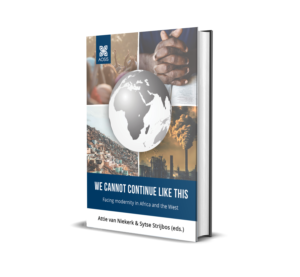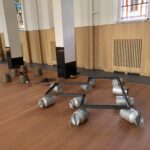Attie S. van Niekerk & Sytse Strijbos (Eds.) – We cannot continue like this: Facing modernity in Africa and Europe
No Comments yet Synopsis
Synopsis
The book is based on the view that the present trajectory of modern development cannot continue as it is now because it is ecologically unsustainable, it continues to enlarge the gap between rich and poor, and the decolonialisation movement has drawn our attention again to the specific role of religion, culture and value in human affairs and the need for a robust element of indigenisation and contextualisation. This book is strongly focused on the context of Africa, with two chapters that are written by authors from the Netherlands, for the purpose of presenting a North-South dialogue. The book contains reflection on approaches followed in building sustainable human communities in general and reflection on specific efforts to solve sustainability issues. It seeks to integrate academic reflection and insights gained from practical involvement with sustainability issues in local communities and low-income households, with contributions from Theology and Natural and Social Sciences.
Download the book (open access):
https://books.aosis.co.za/index.php/ob/catalog/book/283
Preface
This book is the first result of a quite unique and emerging researc collaboration between three organisations, NOVA, the International Institute for Development and Ethics (IIDE) and the Centre for Faith and Community (CFC) that is housed at the Faculty of Theology, University of Pretoria. The central aim is to chart an innovative course in the debate on ‘sustainability and development’. NOVA and IIDE are independent entities that both want to operate as an intermediate between the university and broader society.
The organisations at a glance
About NOVA
NOVA Institute NPC1 is a not-for-profit company that was established in 1994.
Our vision is a healthy household culture in Southern Africa. NOVA’s overarching strategic goal is to be the professional partner of choice for households and other stakeholders working towards improving the quality of life of low-income communities. NOVA has more than 20 years of experience in co-creating solutions for everyday problems with low-income households in a trans-disciplinary research and development process, and in implementing such solutions on a large scale in a phased approach, as well as in monitoring and evaluating the impact of these solutions against a defendable project baseline.
About the IIDE
The early roots of the IIDE go back to 1995 when an international group of about 15 scholars, junior and senior researchers from different disciplines (philosophy, technology and engineering science, management and systems science) came together in Amsterdam. This meeting became the start of a formal cooperation between scholars affiliated with several universities and institutions in different countries and various cultural spheres of the world.
During its first phase, this cooperation has been active as a network under the name CPTS (Centre for Philosophy Technology and Social Systems). After a decade of operations, the CPTS was transformed in 2004 into the IIDE, registered in the Netherlands as a Public Benefit Organisation, in Dutch an Algemeen Nut Beogende Instelling. With the aim of stimulating North–South exchange, an independent IIDE partner organisation has been established in
South Africa and is housed at the University of the Free State, Bloemfontein.
About the Centre for Faith and Community
The CFC is based in the Faculty of Theology and Religion at the University of Pretoria. Its vision is healthy communities through the formation of community and faith-based leaders. It works towards this through a bouquet of basic courses and specialised programmes, aimed at grassroot practitioners and understanding theology as change-making. It also hosts various engaged research programmes, working in and with communities, in support of their emancipatory and transformational processes. Our research themes include faith in the city, pathways out of homelessness, social justice and reconciliation, doing theology with children, spirituality and healthcare and sustainable communities. We host the Urban Studio, using the city as classroom and focusing on six geographical sites in the City of Tshwane. We also manage the Unit for Street Homelessness, doing research on street homelessness locally and nationally, contributing to policy-making processes and facilitating the Pathways Operational Centre, supporting the city and NGOs in their evidence-based homeless interventions.
Charting the course
The collaboration between NOVA, IIDE and CFC deliberately did not start with a sharply defined and detailed programme. To initiate the research process, it was decided to carry out an exploratory project, linking up to fieldwork of NOVA, IIDE and other partners in building sustainable communities. It is expected that by working together in a process of academic reflection as well as learning by doing, a programme will evolve, paving the way for the longer term. An important goal of the research is to enable local churches and other
entities to get involved in their local communities in a meaningful way. This includes developing resources such as skills, knowledge, funds and networks.
Acknowledgements
First of all, we gladly acknowledge Prof. Jerry Pillay, the Dean of the Faculty of Theology and Religion, University of Pretoria, for his financial contribution that has made the publication of this book possible. We also thank the Publisher, Prof. Andries van Aarde, Dr Anna Azarch and Mrs Trudie Retief and Mr Michael Maart of AOSIS for their friendly and professional assistance, as well as the professional language practitioner, Corrie Geldenhuys.
Finally, we wish to thank the anonymous reviewers for their constructive engagement with our work.
Chapters
Introductory Part
Introduction
We cannot continue like this
Attie S. van Niekerk, Sytse Strijbos
Chapter 1
Where do you feel Africa’s heartbeat? The World Bank, Africa and the Christian mission
Attie S. van Niekerk
Chapter 2
Re-Integrating Technology and Economy in Human Life: On the Disclosure of Society
Sytse Strijbos
Part 1: Issues
Chapter 3
Energy transition challenges in South Africa: A study of residential coal use practices
Kristy Langerman, Farina Lindeque, Montagu Murray, Christiaan Pauw
Chapter 4
Towards a complementary approach in sustainable food production
Betsie le Roux, Mike Howard
Chapter 5
Partnerships that flourish or fail: A case study of social entrepreneurship in the Eastern Free State, South Africa
Deidré van Rooyen, Willem F. Ellis
Chapter 6
Stones, bricks and windows: Searching for a sacred place
Willem Jan de Hek
Part 2: Approaches
Chapter 7
From isolation to relation: A trans-disciplinary analysis of an improved cookstove project in Molati, South Africa
Pierre Reyneke
Chapter 8
Decolonising the engineering curriculum at the university
Willem van Niekerk, Attie S. van Niekerk
Chapter 9
Mobilising people to emerge as transformation agents for society building: A reflection on a missional team practice
Luc Kabongo
Chapter 10
The quest of sustainability in this present ‘wicked world’: How to overcome Enlightenment modernity?
Sytse Strijbos
Download the book (open access):
https://books.aosis.co.za/index.php/ob/catalog/book/283
You May Also Like
Comments
Leave a Reply







